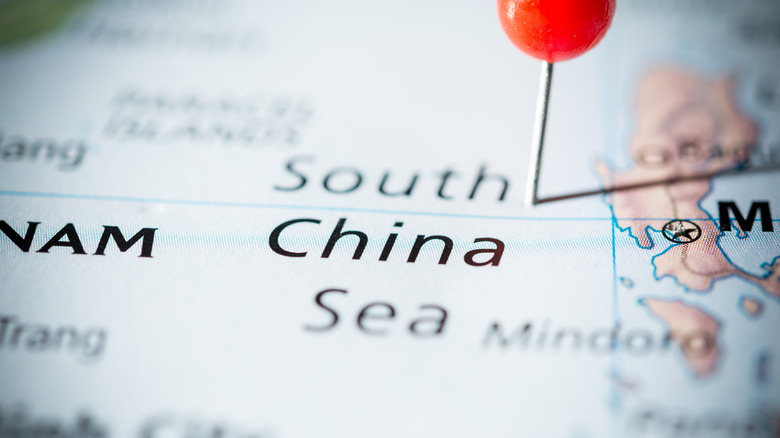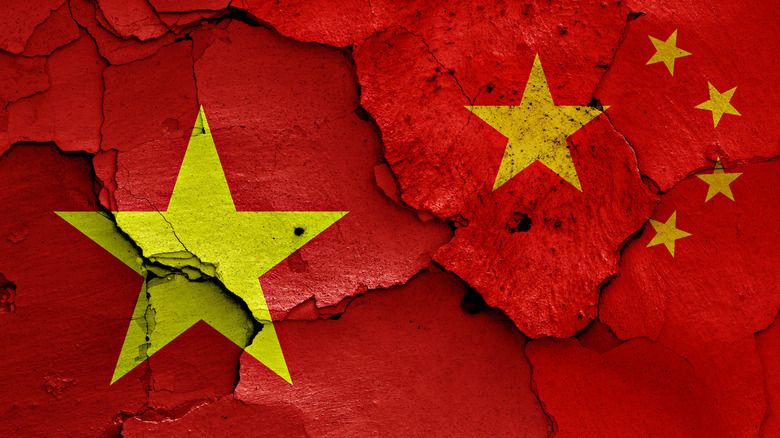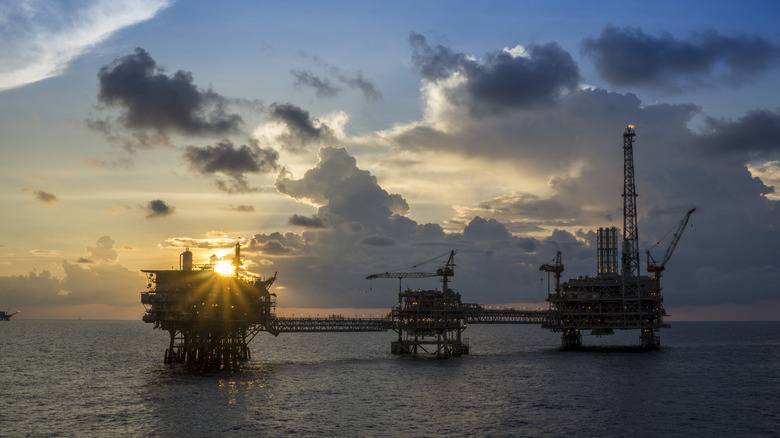China's Nine-Dash Line And The Controversy Behind It Explained
Vietnam and China haven't exactly had the most harmonious historical relationship. Nowadays, as NPR says, mentioning "the war" to Vietnamese people will invoke memories not of invading U.S. troops, but invading Chinese troops. In 1979, 200,000 Chinese troops flooded into Vietnam to "punish" them for interfering with the Khmer Rouge in Cambodia. Remember that this was a time of extreme political turmoil in the region. The Cambodian Khmer Rouge was a maniacal, horrific regime that murdered between 25 and 30% of its own population, as UNESCO says. They were also backed by China.
Vietnam, under communist rule, didn't subjugate Cambodia out of the goodness of its heart, but self-preservation, as the Khmer Times explains. And so China invaded them in retaliation and killed 50,000 people in the short-lived Sino-Vietnamese War. If this was a one-off incident it would be bad enough. But China and Vietnam have been in conflict for almost 2,000 years, as Britannica outlines. The consequences of their mutual animosity reverberate all the way to the present, even down to something as silly as where Hollywood movies get released.
Case in point: the upcoming "Barbie" movie — the least likely thing anyone would ever connect to an ancient Southeast Asian conflict. As The Conversation says, "Barbie" contains an image of the South China Sea that shows the controversial "nine-dash line," a dashed outline of supposedly China-owned waters intruding on Vietnam's space. Vietnam wasn't happy about the image and banned "Barbie's" release in the country.
Territorial claims in the South China Sea
While the nine-dash line might look like nothing more than a dashed line on paper in the South China Sea — because that's what it is — the Chinese government and military take it very, very seriously. They take it so seriously that Hollywood studios like Warner Brothers continue to directly portray the nine-dash line in films like "Barbie," "Uncharted," and "Abominable" to appease the Chinese market even at the cost of alienating countries like Vietnam, as listed on Decider.
Time reports that the nine-dash line is a loose, historically-used but legally-invalid claim on territory not actually belonging to China. Their claim was officially refuted in 2016 when an international tribunal in The Hague, Netherlands, declared that "China's claims to 90% of the world's critical trade route are bogus." But even though this ruling is "legally binding," there are no methods or bodies in place to enforce it. And so the drama over ownership of the South China Sea as outlined by the nine-dash line continues.
As for China's position on all this? As Time says, Chinese Vice Admiral Yuan Yubai said that the South China Sea obviously belongs to China because it has the word "China" in the name. Time also shows how China is so committed to its expansionist maritime policies in the South China Sea that it's been converting reefs in the region into artificial military bases with long landing strips capable of launching jet fighters.
China vs. everyone
A map on Research Gate published in an article in the Asian Journal of Political Science shows how precisely how ludicrous and overreaching the nine-dash line really is. It perfectly curves along the coasts of nearby sovereign countries all the way down past the Philippines, to Malaysia, and circles up past Vietnam. At its southernmost point, the nine-dash line grazes the coast of Kuching, Malaysia, over 1,400 miles away from Macao along China's southern coast. To put things in perspective, that's longer than the distance from New York City to Cuba. Another article on Research Gate says that the entire area encompassed by the nine-dash line exceeds 1,350,000 square miles.
But despite all of China's posturing regarding the South China Sea, the Asia Maritime Transparency Initiative (AMTI) says that nearby countries largely ignore the nine-dash line. Indonesia, Malaysia, and yes, Vietnam, actively engage in ocean drilling within the region. In all cases the Chinese government "harassed" these countries as they set up their operations, and the Chinese Coast Guard patrols nearby. In the case of Vietnam's operations, they patrol "almost daily." It's important to note that each of these operations is conducted in cooperation with Western powers. The U.K.'s Harbour Energy works with Indonesia, Shell with Malaysia, and ExxonMobile with Vietnam. The Philippines pulled out of the area in 2014. CNBC says that China's nine-dash line claims also threaten Japan and South Korea. And of course, all the would-be "Barbie" watchers in Vietnam have to miss out.


